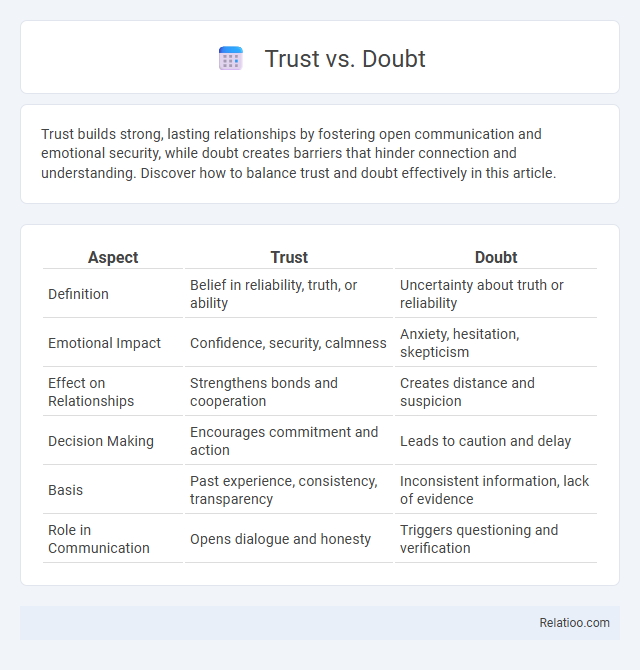Trust builds strong, lasting relationships by fostering open communication and emotional security, while doubt creates barriers that hinder connection and understanding. Discover how to balance trust and doubt effectively in this article.
Table of Comparison
| Aspect | Trust | Doubt |
|---|---|---|
| Definition | Belief in reliability, truth, or ability | Uncertainty about truth or reliability |
| Emotional Impact | Confidence, security, calmness | Anxiety, hesitation, skepticism |
| Effect on Relationships | Strengthens bonds and cooperation | Creates distance and suspicion |
| Decision Making | Encourages commitment and action | Leads to caution and delay |
| Basis | Past experience, consistency, transparency | Inconsistent information, lack of evidence |
| Role in Communication | Opens dialogue and honesty | Triggers questioning and verification |
Understanding Trust and Doubt
Trust involves a confident belief in the reliability, truth, or ability of a person or system, fostering cooperation and positive relationships. Doubt arises from uncertainty or lack of evidence, prompting critical evaluation and cautious decision-making. Understanding trust and doubt enables better judgment in assessing credibility and managing interpersonal or transactional dynamics effectively.
The Psychology Behind Trust
Trust is a fundamental psychological mechanism that allows individuals to form secure relationships and cooperate effectively. Your ability to trust is influenced by early life experiences, attachment styles, and cognitive appraisals of others' behavior, which help distinguish trustworthy signals from doubt and suspicion. Understanding the neural basis of trust, involving areas like the prefrontal cortex and oxytocin pathways, reveals why trust nurtures social bonds while doubt and suspicion serve as protective responses against potential threats.
Origins and Causes of Doubt
Doubt originates from inconsistent information, lack of evidence, or previous experiences of betrayal, which disrupt confidence in a person or situation. It often arises when expectations are unmet or communication is unclear, triggering a cognitive conflict between belief and uncertainty. Suspicion extends doubt by involving a perceived hidden motive or deception, deepening mistrust in relationships or decision-making processes.
Trust vs Doubt in Relationships
Trust in relationships fosters emotional security, openness, and mutual respect, serving as the foundation for deep connection and effective communication. Doubt arises from uncertainty or past experiences, often leading to hesitation and emotional distance, which can undermine relationship stability. Building trust requires consistent honesty, reliability, and empathetic understanding, essential to overcoming doubt and strengthening relational bonds.
Impact of Trust and Doubt on Decision Making
Trust enhances decision making by enabling faster, more confident choices and fostering collaboration, while doubt encourages critical thinking and thorough evaluation, reducing risks of errors. Suspicion, however, can hinder decision processes by promoting skepticism and delaying commitment. Your ability to balance trust and doubt directly impacts the effectiveness and outcomes of your decisions in both personal and professional contexts.
Building Trust: Strategies and Challenges
Building trust requires consistent communication, transparency, and demonstrating reliability in actions over time. Overcoming doubt involves addressing concerns openly and providing evidence that reinforces credibility and competence. Navigating suspicion demands patience and empathy, ensuring that trust is earned through genuine engagement and accountability.
Overcoming Doubt: Practical Techniques
Overcoming doubt involves cultivating self-awareness through mindfulness practices that help identify and challenge negative thought patterns. Engaging in open communication and seeking evidence-based information reduces suspicion, allowing trust to rebuild naturally. Consistent positive experiences and setting realistic expectations reinforce confidence and minimize the impact of doubt in relationships or decision-making.
Trust vs Doubt in the Workplace
Trust in the workplace fosters collaboration, increases productivity, and enhances employee engagement by creating a supportive environment where individuals feel valued and reliable. Doubt, on the other hand, limits open communication, slows decision-making processes, and can lead to decreased morale and inefficiency. Cultivating trust helps you build stronger professional relationships and drives overall organizational success.
The Role of Communication in Trust and Doubt
Effective communication plays a crucial role in establishing trust by promoting transparency, clarity, and consistency, which reduces doubt and suspicion. When messages are clear and honest, individuals feel confident in the reliability and intentions of others, fostering a secure environment. Conversely, ambiguous or misleading communication fuels doubt and suspicion, undermining trust and damaging relationships.
Balancing Trust and Doubt for Personal Growth
Balancing trust and doubt is essential for personal growth, as it allows you to maintain healthy relationships while protecting yourself from potential harm. Trust enables openness and positive connections, whereas doubt encourages critical thinking and cautious decision-making. Cultivating a thoughtful balance between these emotions fosters self-awareness, resilience, and emotional intelligence.

Infographic: Trust vs Doubt
 relatioo.com
relatioo.com